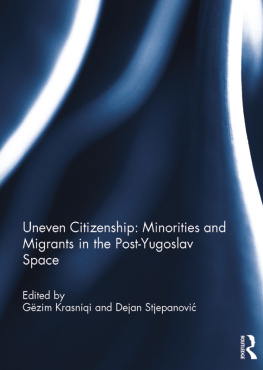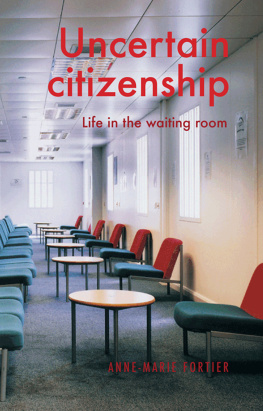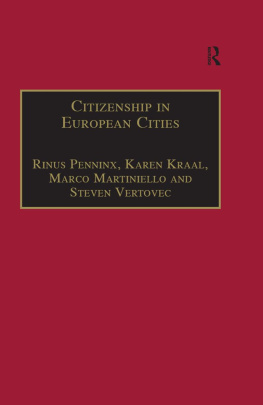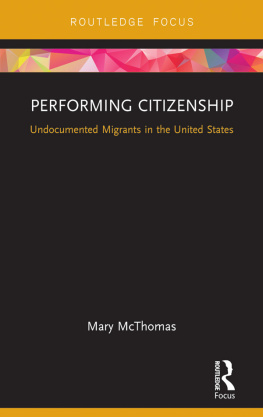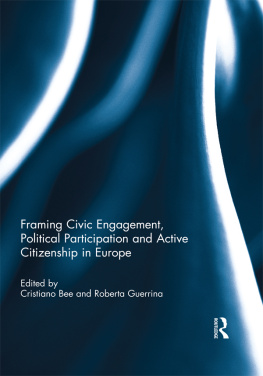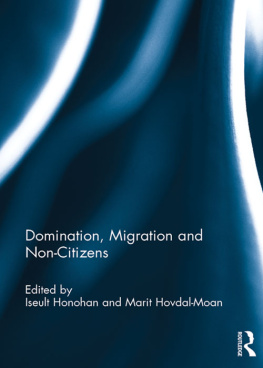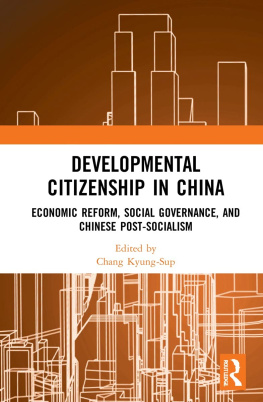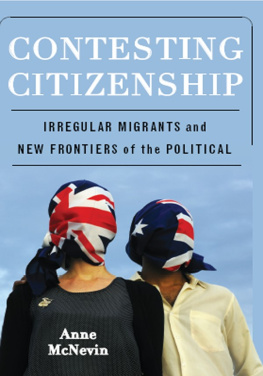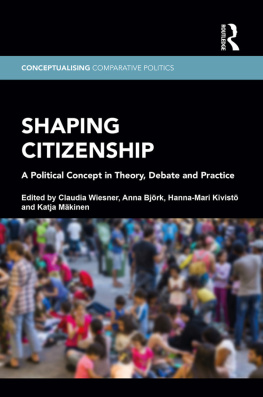Uneven Citizenship: Minorities and Migrants in the Post-Yugoslav Space
This book focuses on the relations between citizenship and various manifestations of diversity, including, but not exclusively, ethnicity. Contributors address migrants and minorities in a novel and original way by adding the concept of uneven citizenship to the debate surrounding the post-Yugoslav states. Referring to this uneven citizenship concept, this book not only engages with exclusionary legal, political and social practices but also looks at other unanticipated or unaccounted for results of citizenship policies.
Individual chapters address statuses, rights and duties of refugees, internally displaced persons (IDPs), returnees, Roma and claimed co-ethnics, as well as various interactions between dominant and non-dominant groups in the post-Yugoslav space. The particular focus is on migrants and minorities, as these are frequently overlapping categories in the post-Yugoslav context and indeed more generally. Not only is policy framework addressed, but also public understanding and the socio-historical developments which created legally and culturally stratified, transnationally marginalized, desired and claimed co-ethnics, and those less wanted, often on the margins of citizenship. This book was originally published as a special issue of Ethnopolitics.
Gzim Krasniqi is the Alexander Nash Fellow at the School of Slavic and East European Studies, University College London, UK. He holds a Ph.D. in Sociology from the University of Edinburgh, UK.
Dejan Stjepanovi is an IRC Post-Doctoral Fellow at University College Dublin, Ireland. He holds a Ph.D. in Political and Social Sciences from the European University Institute, Florence, Italy.
Uneven Citizenship: Minorities and Migrants in the Post-Yugoslav Space
Edited by
Gzim Krasniqi and Dejan Stjepanovi
First published 2016
by Routledge
2 Park Square, Milton Park, Abingdon, Oxon, OX14 4RN, UK
and by Routledge
711 Third Avenue, New York, NY 10017, USA
Routledge is an imprint of the Taylor & Francis Group, an informa business
2016 Stefan Wolff
All rights reserved. No part of this book may be reprinted or reproduced or utilised in any form or by any electronic, mechanical, or other means, now known or hereafter invented, including photocopying and recording, or in any information storage or retrieval system, without permission in writing from the publishers.
Trademark notice: Product or corporate names may be trademarks or registered trademarks, and are used only for identification and explanation without intent to infringe.
British Library Cataloguing in Publication Data
A catalogue record for this book is available from the British Library
ISBN 13: 978-1-138-93462-7
Typeset in Times
by RefineCatch Limited, Bungay, Suffolk
Publishers Note
The publisher accepts responsibility for any inconsistencies that may have arisen during the conversion of this book from journal articles to book chapters, namely the possible inclusion of journal terminology.
Disclaimer
Every effort has been made to contact copyright holders for their permission to reprint material in this book. The publishers would be grateful to hear from any copyright holder who is not here acknowledged and will undertake to rectify any errors or omissions in future editions of this book.
Contents
Gzim Krasniqi and Dejan Stjepanovi
Biljana orevi
Dejan Stjepanovi
Julija Sardeli
Viktor Koska
Gzim Krasniqi
The chapters in this book were originally published in Ethnopolitics, volume 14, issue 2 (March 2015). When citing this material, please use the original page numbering for each article, as follows:
Uneven Citizenship: Minorities and Migrants in the Post-Yugoslav Space
Gzim Krasniqi and Dejan Stjepanovi
Ethnopolitics, volume 14, issue 2 (March 2015) pp. 113 120
Whose Rights, Whose Return? The Boundary Problem and Unequal Restoration of Citizenship in the Post-Yugoslav Space
Biljana orevi
Ethnopolitics, volume 14, issue 2 (March 2015) pp. 121139
Claimed Co-ethnics and Kin-State Citizenship in Southeastern Europe
Dejan Stjepanovi
Ethnopolitics, volume 14, issue 2 (March 2015) pp. 140158
Romani Minorities and Uneven Citizenship Access in the Post-Yugoslav Space
Julija Sardeli
Ethnopolitics, volume 14, issue 2 (March 2015) pp. 159179
Refugee Integration and Citizenship Policies: The Case Study of Croatian Serbs in Vojvodina
Viktor Koska
Ethnopolitics, volume 14, issue 2 (March 2015) pp. 180196
Equal Citizens, Uneven Communities: Differentiated and Hierarchical Citizenship in Kosovo
Gzim Krasniqi
Ethnopolitics, volume 14, issue 2 (March 2015) pp. 197217
Please direct any queries you may have about the citations to
Biljana orevi is a teaching and research associate and a Ph.D. student at the Faculty of Political Sciences, University of Belgrade, Serbia.
Viktor Koska is a teaching and research assistant and a Ph.D. student at the Faculty of Political Science, University of Zagreb, Croatia.
Gzim Krasniqi is the Alexander Nash Fellow at the School of Slavic and East European Studies, University College London, UK. He holds a Ph.D. in Sociology from the University of Edinburgh, UK.
Julija Sardeli is a post-doctoral researcher in the Max Weber Program at the European University Institute, Florence, Italy.
Dejan Stjepanovi is an IRC Post-Doctoral Fellow at University College Dublin, Ireland. He holds a Ph.D. in Political and Social Sciences from the European University Institute, Florence, Italy.
GZIM KRASNIQI & DEJAN STJEPANOVI
University of Edinburgh, UK
A BSTRACT The special issue revolves around the relations between citizenship and various manifestations of diversity including, but going beyond, ethnicity. A number of interesting recent attempts to rethink citizenship are addressed by the addition of uneven citizenship to the debate. While referring to uneven citizenship the special issue not only engages with exclusionary legal, political and social practices but also other unanticipated or unaccounted for results of citizenship policies. The individual papers address statuses, rights, and duties of refugees, internally displaced persons (IDPs), returnees, Roma, claimed co-ethnics as well as various interactions between dominant and non-dominant groups in the post-Yugoslav space.
Despite the argument that state supremacy over various other types of political communities (cities, regions and global) might be waning, states still remain the primary arbiters of political, social and civic rights, that is, of the constitutive elements of citizenship (Marshall, 1950). Citizenship as the broader category of rights attempts to provide formal equality between members of a polity. Recent waves of voluntary and forced migration have also been marked by increased toleration of dual citizenship and conferring kin-state citizenship en masse. In the European context, we are witnessing the emergence of multi-level political structures and citizenship resulting from the European integration processes, contributing to the increase in a number of political communities in which individual citizens have a stake. These developments have in turn redefined citizenship and given rise to multiple forms of citizenship constellations (Baubck, 2010); horizontal in which, for example, an individual is citizen of two states simultaneously and vertical, nested type of constellations, where a person is a member of a sub-state, state and supra-state polities.

